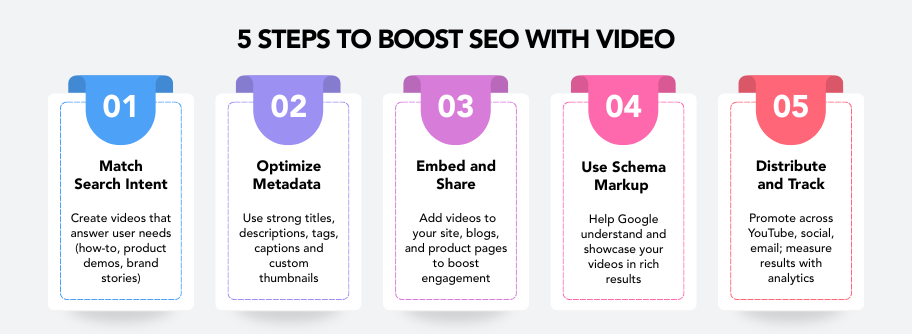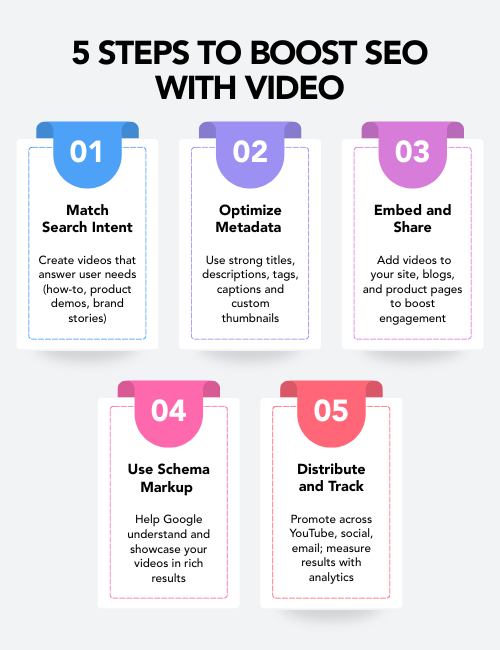

Why Google Favors Video Content
If you pay close attention to the way people behave online, you will understand why Google favors videos so much. Naturally, most of us tend to lean more towards videos, because they offer quick explanations and are far more engaging than the long and mundane blogs that come before us, and Google is very aware of that. This is why; it has started to give videos such importance.However, this doesn’t mean that the importance of blogs and articles have come to cease—they are still pretty much important according to SEO services companies. However, video SEO has become equally liable for the growth of your business online: gaining wider, stronger, and quicker reach.
Videos Keep Users Engaged Longer
As per research and studies, people spend about 88% more time on websites with video, than compared to plain articles. So, when Google notices that people are spending and staying on your website for a good time, it starts pulling your website up which increases your chances of achieving best search engine ranking.Video Matches Search Intent
For many searches, videos give clearer and more interesting answers than text, since they offer you a full demonstration, making it easier for you to follow up. Plus, they are far more engaging than text and can be watched by anyone. Hence, try filming optimized videos like how-to guides and tutorials.YouTube Is a Google Product
Google owns YouTube, which is the world’s second-biggest search engine. So, you shouldn’t be astonished to find Google pushing up video content—especially from YouTube—into its Google SERP features like video carousels and suggested clips.Mobile-First Experience
Since most people search on their phones now, videos match their habits. For them, watching a short and easy video is more convenient than scrolling through long paragraphs.How Video Impacts SEO Rankings
So, when you incorporate video SEO to your SEO strategy, a lot of the important factors for Google ranking will automatically start to improve and show results.Boosts Dwell Time and Reduces Bounce Rate
If someone watches a 2–3-minute video, they stay on your site longer. This shows Google that your page is useful. Also, a good and engaging video is always going to hold the audience, stopping them from leaving your content after a second of scrolling.Increases Click-Through Rates (CTR)
Search results with video thumbnails are more likely to attract audience, rather than plain text. Videos make the result look more appealing and reliable, which ultimately leads to more people clicking on it.Generates Backlinks and Shares
Good-quality videos have a strong likelihood of being shared on social media or being added on blogs and articles—bringing people to your videos through backlinking. Backlinks have always proved to be an essential factor for ranking and can be a big help for your video SEO ranking.Helps Capture Featured Snippets
Google often shows video content in Google SERP features, especially for “how-to” searches. This puts your content right at the top of the results, even above regular listings.Enhances Local SEO
By adding videos to your Google Business Profile or local landing pages, you can attract more customers. This is a very useful way to increase your visibility and can even help you reach the best search engine ranking in local searches.Making Video Work for Your SEO: Step-by-Step
Now that we have gone through the significance of video SEO, let’s learn to make it work for your SEO strategy. Here is a step-by-step guide for you:
Step 1: Align Video Content with User Intent
The algorithms of Google have evolved with time; hence their focus has shifted more towards search intent now. This is why it is important for you to answer the intent behind search queries, rather than only focusing on keywords.Informational Intent
Create tutorials, explainers, or educational content. Example: “How to Use SEO Tools for Keyword Research.”
Transactional Intent
Product demos or comparison videos. Example: “Best SEO Tools for Small Businesses.”
Navigational Intent
Brand-focused videos, such as a company story or culture video.
Step 2: Optimize Video Metadata
Similar to websites, videos also need to be on-page optimized.Title
Add your main keyword but be careful to not make it sound forced.
Description
Write a short summary with keywords. If you have filmed a long video, then you can add timestamps.
Tags
Use tags that match your topic, including long-tail keywords.
Thumbnail
Pick a custom thumbnail that stands out — CTR depends a lot on this.
Transcripts & Captions
These make videos easier to access and give Google extra text to crawl, which helps with video SEO ranking.
Step 3: Embed Videos on Your Website
Make sure that you are not abandoning your videos; share them with others and add them to different pages.
- Product demos can be utilized on your product pages.
- Educational or explanatory videos can be added in well in blog posts.
- Brand videos can go on your homepage.
Step 4: Use Video Schema Markup
Using structured data (schema markup) helps Google understand what your video is actually about. So, with video schema, your content can show up as rich snippets, and can also demonstrate details like length, upload date, and key moments in Google SERP features.
You can use tools like Google’s Structured Data Markup Helper or WordPress plugins like Yoast SEO to make this easier.
Step 5: Focus on Video Quality and User Experience
Google favors content that’s useful, so if you are adding low-quality videos just for the sake of video SEO, your efforts are completely futile. Therefore, keep the quality of your videos top-notch:
- Use good lighting, clear sound, and neat editing.
- Keep it short—2 to 5 minutes usually works best.
- Add subtitles so more people can watch.
- Make sure videos load fast by using compressed files and good hosting.
Step 6: Build a Strong Distribution Strategy
Clicking the ‘upload’ button is not enough alone, you have to work hard to get views and engagement. So, I would always advise you to come up with a proper strategy:YouTube SEO
Use playlists, end screens, and cards to keep people watching.
Social Media
Post clips on LinkedIn, Instagram, TikTok, and Facebook.
Email Marketing
Add short video previews or GIFs in newsletters.
Content Repurposing
Cut longer videos into short clips, reels, or blog embeds.
Step 7: Track Performance and Adjust
Last but not least, don’t underestimate the significance of tracking your progress, since it highlights your laggings and achievements.Google Analytics
Look at dwell time, bounce rates, and conversions on video pages.
YouTube Analytics
Track watch time, audience retention, CTR, and engagement.
Google Search Console
See if your videos show up in the “Video” section of Google SERP features.
Common Mistakes in Video Making
Even if you’re pouring your heart and soul into your video creation, the slightest bit of mistake can cause your chances of getting the best search engine ranking to wane. After all, what’s the point of creating content if no one can actually find it? Let’s broach some of the most common ones:Not Optimization Videos
Uploading videos which are not fully edited and optimized, without any caption or metadata, don’t have any chances of ranking, since Google seldom rewards content that isn’t polished.
Hosting on Slow Servers
A server which takes ages to load is highly capable of making your page speed crawl—trust me when I say this: Google won’t show any generosity before penalizing your video SEO ranking.
Ignoring Mobile Users
Nowadays, mobile phones are the most used devices; therefore, make your videos in vertical and square formats for good performance.
Making Videos Too Long
Attention spans wane fast. So, try making your video not too long; I would advise you to keep it about 20-30 seconds.
No Clear CTA (Call-to-Action)
Every video should subtly push the viewer to subscribe, share, or check out your site.
The Future of Video and SEO
Google keeps changing the way it works, and videos are only getting more important. Here are some anticipations for the future:AI Videos
AI Tools like Synthesia and Runway are becoming more handy for making and editing videos.
Interactive Videos
You’ll see more videos where you can click, choose options, or follow different paths.
Short Videos
TikTok, Instagram, and YouTube will be the most-watched form of videos.
Voice + Video Search
With smart speakers and assistants, voice searches will often bring up videos too.
Google ranks videos higher for a simple reason: people enjoy watching them. If you want to keep up in SEO today, adding Rich media content should be your top priority. When your videos serve the queries of people, have the right titles and tags, and are uploaded on your website, the chances of your videos ranking high increase.
Want to learn more? Feel free to get in touch with us.
Frequently Asked Questions
Why is Video SEO so important in today’s search rankings?
Video content has become one of the most watched and popular forms of content over time, and search engines see its impact on user engagement. Moreover, Google has also started to place videos on top of the search result page, since videos are more likely to captivate the audience for a longer period, plus they are also more easy to understand and learn from. Thus, by uploading well optimized videos, you can easily gain visibility in both search results and platforms like YouTube.
What does a video SEO expert actually do?
A video SEO expert makes sure that your videos can be found by searchers and rank high. Their tasks are to find top video keywords, write SEO friendly titles, and Meta descriptions. Moreover, they also structure your video to intend for an increase in watch time, along with building backlinks and promoting videos to attain a better and wider reach.
What is rich media content, and why does Google prioritize it?
Rich media content is referred to as content which is interactive as well as engaging; this includes videos, infographics, and animations. Unlike written content, it is captivating for audience, tends to reduce bounce rate, and offers various ways of providing knowledge.
What are the key factors that influence video SEO ranking?
There are many factors which influence video SEO ranking. It includes Keyword optimization (title, description, tags), Video engagement (watch time, likes, comments, shares), Thumbnail quality (click-through rate), Technical SEO (video sitemap, schema markup), Backlinks and embeds from other sites, and Relevance and freshness of the content.
What's the fastest way to improve my video SEO strategy?
To improve your video strategy fast, you should start off with better keyword targeting and metadata optimization. Keep your titles, descriptions, and thumbnails updated in order to improve click-through rates and visibility. Adding transcripts or captions helps search engines index your video more effectively. For longer-term growth, focus on audience retention and encouraging interaction.



